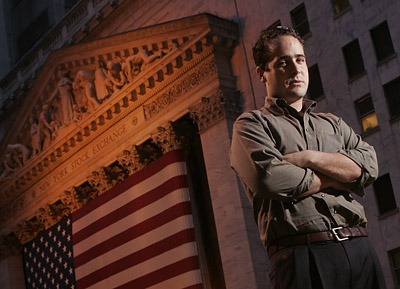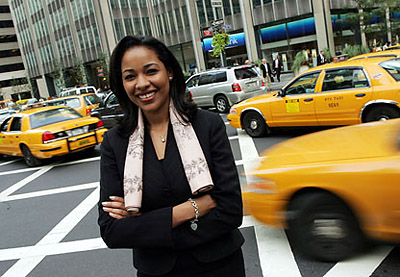Heard on the Street
Young alums heading off to Wall Street say that pursuing a career in business is no longer a ‘solo trip.’
By H. Jay Burns Photos by Michael Appleton
Three young alums, Lena Sene ’00, Eduardo Crespo ’04 and Melissa Wilcox ’03, talked with Bates Magazine about their chosen paths from College Street to Wall Street. If one recalls how Tom Wolfe described “well-educated young white men baying for money” in The Bonfire of the Vanities 20 years ago, then in a macro sense these young alums symbolize Wall Street’s changing face.
And in a micro sense, the experiences of Sene, Crespo and Wilcox might point to a change at Bates too, says Charles Kovacs, director of the Office of Career Services. For years, if not generations, the College’s genetic disposition toward careers in nonprofit service or education meant that “some alumni who’ve gone into [for-profit] management have felt they had to do it all on their own,” says Kovacs. “They felt it was a solo trip.”
But today, the for-profit business trail is more traveled, Kovacs says, as Bates establishes “a beachhead” in the business community. He cites the example of Ben Bruce ’02, who joined IBM Business Consulting Services a year after graduation. “IBM was so impressed that, with Ben’s encouragement, they recruited on campus last spring — the first time in a decade for any IBM division,” he says. “They interviewed Bates, Bowdoin, and Colby students and made 12 offers to students from Bates, five to Colby, and one to Bowdoin.”
“Once the larger firms taste Bates quality,” he smiles, “they come back for more.”
Eduardo Crespo ’04

Elected president of his Bates class, Eduardo Crespo ’04, of Quito, Ecuador, is with Goldman Sachs, in the financial analyst training program. He’s working in equity research sales, covering the pan-European research sales desk, which means Crespo’s workday begins at 5 a.m.
How did you choose Bates?
I had a meeting with a Fulbright director in Ecuador, and she said, “I think you’re going to go to Bates.” My father and I laughed. We were there to talk about Harvard, Yale, Stanford, and Columbia, and she came up with this foreign-sounding name. During the admissions process, Bates people called me to encourage my matriculation — no other college did — and I felt at home immediately.
At one time, you wanted to return to Ecuador after college. Now you’re in an investment bank in Manhattan.
At Bates, I attained the capacity to reason and be more realistic. One can still dream about future goals, but you also need to think about what you can do now.
I left Ecuador with great passion for becoming president there someday, to help create more stability. I haven’t lost that idealism — you could, in this business. Rather, I am at Goldman Sachs because this field provides that kind of leverage too. You are exposed to encompassing knowledge that few people have. You have the capacity to do really outstanding things.
Such as?
You see people every day who are committed to their colleges or to a foundation or a non-government organization. Look at Tom Renyi, the father of a Bates classmate, president of the Bank of New York, and Bates Trustee who takes time to support an institution that changes 1,700 lives. Then a goal for me is to interact with people who have that sort of flight in life, who go beyond their own wealth and even their families to look after others and try to change the world.
Who have been mentors?
When my family came for Commencement, I wished they could sit down with each one of my faculty advisers, because each one is a story and mentor. Like Felicia Fahey, a Spanish faculty member, who kept up with me while I was at Oxford during my year abroad. She helped me obtain research grants to study immigration and the diaspora in Italy.
The Bates Trustees, too, helped me. If you are a student leader of any activity or sport at Bates that includes the community as a whole, you will have the opportunity to meet these fantastic people.
What is different in your work from what you expected?
You don’t understand at first that you will be learning so much and so fast. You’re thrown into the material as soon as you walk in. Perhaps another thing is the teamwork. It’s one of our core values.
Teamwork doesn’t mean someone picking up your slack…
This industry rewards boldness and execution, so you have to be sharp and on the spot.
You are allowed to make a few mistakes as you take risks, but the thing you have to remember is this: A mistake can be made, just not twice.
How have issues like corporate accountability and the mutual fund scandal affected your work?
One of the biggest things Goldman is trying to instill is this: A single person can damage the reputation of our firm more than help it. You’re dealing with hefty sums of money, so you know immediately that all the regulations and rules apply to you. You feel things that people in other fields experience only in management. It helps that the idea of integrity is so important at Bates. The people I encountered at Bates had amazing values and respect for their institution and peers.
Lena Sene ’00

American-born but raised in Senegal, spending summers in the Ukraine, Lena Sene ’00 is at Lehman Brothers in Private Client Services, where she helps manage investment relationships with institutional clients and high net-worth (above $10 million) individual clients.
When did you choose this career path?
Through Inroads, a national program that offers internships to minority students, I interned each summer at UNUM in Portland. The third summer the corporate treasurer introduced me to his contacts at investment banks in New York. I found out then I was interested more in the private banking side of the business.
What was the mechanism for getting from Bates to your first job?
Through the Office of Career Services, Bates is part of the Big Apple Consortium, which at the time included financial firms. You submit your resumé, and firms invite candidates to come to New York for interviews. I had eight or nine interviews in one day, including JP Morgan Private Bank, with whom I worked for three years.
What were you looking for in an investment bank?
Obviously I’m a woman and a person of color. But I was not just looking for a place where the people look like me. That’s not the point. It’s the overall atmosphere: When you talk with people, how do they come across? Are they open and inviting? Do they like what they’re doing? That’s beyond diversity.
How true is it that in personal interactions with colleagues and clients, you have to be exceptional at it, all the time?
That’s 100 percent true. People make judgments about how good you are from the moment you start interacting with them. But expectations have to be high — you’re dealing with other people’s money.
Sort of like Trump in The Apprentice. You screw up, you’re fired.
And it’s hard to change your reputation once you’ve hurt it. Some people are not comfortable in this environment. That’s why it’s important to do your homework before you get into this field.
Did your Bates background give you a level of comfort with being direct?
At first, I sat on the sidelines at Bates. I was the only student from the African continent at the time, and my first winter I hurt my wrist in a fall. Then I realized that I could sit here and never meet anyone, or I could approach people. It’s hard to make the first step to become involved, but it’s worth the effort and soon becomes fun. So I learned that you have to speak up — Bates taught me to be a leader, quite frankly. When I’m in an intense meeting with high-ranking people, I don’t feel at all intimidated.
How does working in an investment bank reflect your interest in social justice?
Tomorrow afternoon I head to Turkey with a delegation of 10 as part of Network 20/20, a not-for-profit organization of which I am a founding member. Our mission is to identify promising leaders across different fields, people who are interested in substantive discussion of foreign-policy issues, and to build bridges with counterparts in other countries.
Having spent most of my life in Senegal, I empathize with those living in poor conditions. My longer-term goal is to use my finance background to help provide seed capital to entrepreneurs in Africa — creating jobs in the process, one of the most crucial needs in that part of the world.
Melissa Wilcox ’03

Melissa Wilcox ’03 grew up in Glastonbury, Conn., the daughter of Bates alums David ’75 and Margaret McCann Wilcox ’74. She is in her second year of Citigroup’s training program for sales and trading analysts; right now she’s in fixed-income international sales, selling government bonds to institutional clients like hedge funds or mutual funds.
What helped you find this job?
Career Services, internships, and alumni.
Who helped you along the way?
Bates people. I was involved in student government and met Trustees that way, like Joe Willett ’73 [then chief operating officer for Merrill Lynch for Europe, the Middle East, and Africa, now retired] or an entrepreneur like David Barlow ’79; he got his M.B.A. at Stanford, and business school is something I want to do. I had a Ladd internship with Brian Wells ’97 at UBS Paine Webber and Career Discovery internships with Ken Swan ’82, CEO of Lee Munder Capital Group, and Stu Abelson ’97, who’s with Amphenol Corp.
Did your economics major prepare you?
Economics is a natural major for people in this industry, and my education gave me confidence that I could learn what I needed to learn for my job. But a training program is like starting school. Your college major really doesn’t matter because you have so much to learn.
Compare the interaction you had with people at Bates to what you’re finding now.
Bates interaction is the gold standard. Bates professors are interested in you and what you’re doing. It’s possible to find those people outside the Bates bubble, but you’re also going to find people who don’t really care what you do or who you are.
What did you imagine Wall Street would be like versus the reality?
Everyone looks at CNBC or MSNBC and thinks “fast pace, high energy, a lot of excitement.” That’s true, but there are slow times as well. During the slow times people definitely know how to kick back and relax and have fun. You have to work hard, but you also have to know how to have a good time. And you have to move from one to the other quickly.
How is that part of the Wall Street culture?
You have to figure things out fast and adapt quickly to different personalities. If you offend someone, it’s called “blowing up.” And people don’t let it slide; they let you know.
Sounds like rushing a fraternity. You screw up, it’s over.
It’s exactly like that. Wall Street is a very small place, and everyone knows each other. I mentioned a name to someone while rotating, and the guy immediately sends a Bloomberg message to the person whose name I dropped, asking, “Do you remember this girl?” The business has gotten away from just fathers bringing in their sons — they bring their daughters in, too — but who you know, who you really know, rather than what you know, is still part of doing business.
The Morgan Stanley gender-discrimination settlement suggests that gender issues still remain.
The firms are very focused on cultivating an environment where women are comfortable. Citigroup has the reputation of being a place you can come in from any background and do well. There are a lot of women on the trading floor, in equities or fixed income, but if you took away the assistants and back-office people who are women, there would be a lot fewer. You’re in smaller supply than you think.
Tell me about another hot-button issue.
Political correctness, whether trying to be PC constrains people from communicating. Wall Street is not a very politically correct place; people say things in jest, but it’s something you would never hear at Bates.
Bates is not a so-called target school for Wall Street firms. Why do you think you got hired?
When you see kids hired from non-target schools, I think it simply reflects the real strength of the candidate’s resumé. I’m proud of that fact that I did not know one person at Citigroup; no one pulled strings. It was my resume. Of course, a lot of Batesies helped me build it!